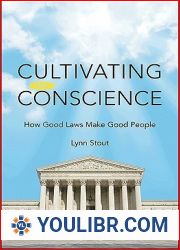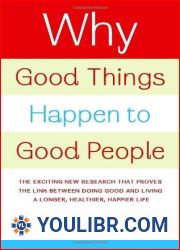
BOOKS - Cultivating Conscience: How Good Laws Make Good People

Cultivating Conscience: How Good Laws Make Good People
Author: Lynn Stout
Year: January 1, 2010
Format: PDF
File size: PDF 1.1 MB
Language: English

Year: January 1, 2010
Format: PDF
File size: PDF 1.1 MB
Language: English

Cultivating Conscience: How Good Laws Make Good People In this groundbreaking book, acclaimed law and economics scholar Lynn Stout challenges the conventional wisdom that human beings are inherently selfish and that punishment and rewards are the key to promoting good behavior. Instead, she argues that our better impulses play a crucial role in shaping society, and that we should rely on the power of conscience to foster unselfish behavior. Drawing from social psychology, behavioral economics, and evolutionary biology, Stout demonstrates how social cues, such as instructions from authorities, ideas about others' selfishness and unselfishness, and beliefs about benefits to others, can trigger unselfish behavior. She also shows how our legal system can use these social cues to craft better laws that encourage more unselfish ethical behavior in politics, business, and other realms. Stout begins by examining the flaws in the current approach to law and public policy, which assumes that people are primarily driven by self-interest and must be controlled through punishment and rewards. She contends that this focus neglects the positive role that our own good behavior plays in society and instead fixates on the negative actions of a few individuals. She argues that by overlooking our own unselfish acts, we miss out on the opportunity to cultivate our conscience and promote a more civilized society.
Культивирование совести: как хорошие законы делают хороших людей В этой новаторской книге известный ученый в области права и экономики Линн Стаут бросает вызов общепринятому мнению, что люди по своей природе эгоистичны и что наказание и вознаграждение являются ключом к продвижению хорошего поведения. Вместо этого она утверждает, что наши лучшие побуждения играют решающую роль в формировании общества, и что мы должны полагаться на силу совести, чтобы способствовать бескорыстному поведению. Опираясь на социальную психологию, поведенческую экономику и эволюционную биологию, Стаут демонстрирует, как социальные сигналы, такие как инструкции от властей, идеи об эгоизме и бескорыстии других и убеждения о пользе для других, могут вызвать бескорыстное поведение. Она также показывает, как наша правовая система может использовать эти социальные сигналы для разработки лучших законов, которые поощряют более бескорыстное этическое поведение в политике, бизнесе и других сферах. Стаут начинает с изучения недостатков нынешнего подхода к праву и государственной политике, который предполагает, что люди в первую очередь движимы корыстью и должны контролироваться через наказание и вознаграждение. Она утверждает, что этот фокус пренебрегает положительной ролью, которую наше собственное хорошее поведение играет в обществе, и вместо этого зацикливается на негативных действиях нескольких людей. Она утверждает, что, игнорируя наши собственные бескорыстные действия, мы упускаем возможность культивировать свою совесть и продвигать более цивилизованное общество.
Cultiver la conscience : comment les bonnes lois font les bonnes personnes Dans ce livre novateur, Lynn Stout, éminente scientifique du droit et de l'économie, récuse l'idée généralement admise que les hommes sont par nature égoïstes et que la punition et la récompense sont la clé pour promouvoir le bon comportement. Au lieu de cela, elle affirme que nos meilleures motivations jouent un rôle crucial dans la formation de la société, et que nous devons compter sur la force de la conscience pour promouvoir un comportement désintéressé. S'appuyant sur la psychologie sociale, l'économie comportementale et la biologie évolutionnaire, Stout montre comment les signaux sociaux, tels que les instructions des autorités, les idées d'égoïsme et de désintéressement des autres et les croyances sur les bienfaits des autres, peuvent déclencher un comportement désintéressé. Elle montre également comment notre système juridique peut utiliser ces signaux sociaux pour élaborer de meilleures lois qui encouragent un comportement éthique plus désintéressé en politique, dans les affaires et dans d'autres domaines. Stout commence par examiner les inconvénients de l'approche actuelle du droit et des politiques publiques, qui suppose que les gens sont principalement motivés par l'égoïsme et doivent être contrôlés par des sanctions et des récompenses. Elle affirme que cet accent néglige le rôle positif que joue notre propre bonne conduite dans la société et se concentre plutôt sur les actions négatives de plusieurs personnes. Elle affirme qu'en ignorant nos propres actions désintéressées, nous manquons l'occasion de cultiver notre conscience et de promouvoir une société plus civilisée.
Cultivar la conciencia: cómo las buenas leyes hacen a las buenas personas En este libro pionero, la reconocida científica de derecho y economía Lynn Stout desafía la creencia generalmente aceptada de que las personas son por naturaleza egoístas y que el castigo y la recompensa son la clave para promover una buena conducta. En cambio, afirma que nuestros mejores impulsos juegan un papel crucial en la formación de la sociedad, y que debemos confiar en el poder de la conciencia para promover el comportamiento desinteresado. Basándose en la psicología social, la economía del comportamiento y la biología evolutiva, Stout demuestra cómo las señales sociales, como las instrucciones de las autoridades, las ideas sobre el egoísmo y el desinterés de los demás y las creencias sobre el beneficio para los demás, pueden desencadenar comportamientos desinteresados. También muestra cómo nuestro sistema legal puede usar estas señales sociales para desarrollar mejores leyes que fomenten comportamientos éticos más desinteresados en la política, los negocios y otras áreas. Stout comienza explorando los inconvenientes del enfoque actual del derecho y la política pública, que sugiere que las personas son impulsadas principalmente por el interés propio y deben ser controladas a través del castigo y la recompensa. Ella argumenta que este enfoque descuida el papel positivo que nuestro propio buen comportamiento juega en la sociedad, y en cambio se obsesiona con las acciones negativas de varias personas. Afirma que, ignorando nuestras propias acciones desinteresadas, perdemos la oportunidad de cultivar nuestras conciencias y promover una sociedad más civilizada.
Cultivar a consciência: Como as boas leis fazem as pessoas boas Neste livro inovador, Lynn Stout, cientista de direito e economia, desafia a crença convencional de que as pessoas são, por natureza, egoísta e que o castigo e a recompensa são a chave para promover o bom comportamento. Em vez disso, ela afirma que os nossos melhores estímulos são cruciais para a formação da sociedade, e que devemos confiar no poder de consciência para promover o comportamento desinteressado. Baseado em psicologia social, economia comportamental e biologia evolucionária, Stout demonstra como sinais sociais, tais como instruções das autoridades, ideias sobre egoísmo e desinteresse dos outros e crenças sobre os benefícios dos outros, podem provocar comportamentos desinteressados. Ela também mostra como o nosso sistema legal pode usar esses sinais sociais para desenvolver leis melhores que encorajem um comportamento ético mais desinteressado em políticas, negócios e outras áreas. O Rebouças começa por estudar as falhas da atual abordagem do direito e das políticas públicas, que sugere que as pessoas são movidas primeiramente pela coerência e devem ser controladas através de punições e recompensas. Ela afirma que este foco desrespeita o papel positivo que a nossa própria boa conduta desempenha na sociedade e, em vez disso, se baseia nas ações negativas de várias pessoas. Ela afirma que, ignorando as nossas próprias ações desinteressadas, perdemos a oportunidade de cultivar a nossa consciência e promover uma sociedade mais civilizada.
Coltura di coscienza: come le buone leggi fanno le brave persone In questo libro innovativo, Lynn Stout, la famosa scienziata del diritto e dell'economia, sfida la convinzione comune che le persone siano egoiste e che la punizione e la ricompensa siano la chiave per promuovere un buon comportamento. Invece sostiene che i nostri migliori stimoli hanno un ruolo cruciale nella formazione della società, e che dobbiamo contare sulla forza della coscienza per promuovere comportamenti altruisti. Basandosi sulla psicologia sociale, sull'economia comportamentale e sulla biologia evoluzionaria, Stout dimostra come i segnali sociali, come le istruzioni delle autorità, le idee sull'egoismo e l'altruismo degli altri e le convinzioni sui benefici per gli altri, possano generare comportamenti altruisti. Mostra anche come il nostro sistema legale possa utilizzare questi segnali sociali per sviluppare leggi migliori che incoraggiino comportamenti etici più disinteressati in politica, affari e altri settori. Il branco inizia studiando i difetti dell'attuale approccio al diritto e alla politica pubblica, che suggerisce che le persone sono guidate principalmente dalla corazzata e devono essere controllate attraverso la punizione e la ricompensa. Sostiene che questo focus trascura il ruolo positivo che il nostro buon comportamento svolge nella società e invece si concentra sulle azioni negative di più persone. Sostiene che ignorando le nostre azioni altruistiche, perdiamo l'occasione di coltivare la nostra coscienza e promuovere una società più civilizzata.
Kultivierung des Gewissens: Wie gute Gesetze gute Menschen machen In diesem wegweisenden Buch stellt die renommierte Rechts- und Wirtschaftswissenschaftlerin Lynn Stout die allgemein akzeptierte Auffassung in Frage, dass Menschen von Natur aus egoistisch sind und dass Bestrafung und Belohnung der Schlüssel zur Förderung guten Verhaltens sind. Stattdessen argumentiert sie, dass unsere besten Motive eine entscheidende Rolle bei der Gestaltung der Gesellschaft spielen und dass wir uns auf die Kraft des Gewissens verlassen müssen, um selbstloses Verhalten zu fördern. Aufbauend auf Sozialpsychologie, Verhaltensökonomie und Evolutionsbiologie zeigt Stout, wie soziale gnale wie Anweisungen von Behörden, Ideen über den Egoismus und die Selbstlosigkeit anderer und Überzeugungen über den Nutzen für andere selbstloses Verhalten auslösen können. Es zeigt auch, wie unser Rechtssystem diese sozialen gnale nutzen kann, um bessere Gesetze zu entwickeln, die ein selbstloseres ethisches Verhalten in Politik, Wirtschaft und anderen Bereichen fördern. Stout beginnt mit der Untersuchung der Mängel des derzeitigen Ansatzes für Recht und öffentliche Ordnung, der davon ausgeht, dass Menschen in erster Linie von Eigennutz getrieben werden und durch Bestrafung und Belohnung kontrolliert werden müssen. e argumentiert, dass dieser Fokus die positive Rolle vernachlässigt, die unser eigenes gutes Verhalten in der Gesellschaft spielt, und stattdessen auf die negativen Handlungen einiger weniger Menschen fixiert ist. e argumentiert, dass wir durch das Ignorieren unserer eigenen selbstlosen Handlungen die Gelegenheit verpassen, unser Gewissen zu kultivieren und eine zivilisiertere Gesellschaft zu fördern.
''
Vicdanı Geliştirmek: İyi Yasalar İyi İnsanları Nasıl Yaratır Bu çığır açan kitapta, ünlü hukuk ve ekonomi bilgini Lynn Stout, insanların doğası gereği bencil oldukları ve ceza ve ödülün iyi davranışı teşvik etmenin anahtarı olduğu yönündeki geleneksel bilgeliğe meydan okuyor. Bunun yerine, en iyi dürtülerimizin toplumu şekillendirmede çok önemli bir rol oynadığını ve özverili davranışları teşvik etmek için vicdanın gücüne güvenmemiz gerektiğini savunuyor. Sosyal psikoloji, davranışsal ekonomi ve evrimsel biyolojiden yararlanan Stout, yetkililerden gelen talimatlar, başkalarının bencilliği ve ilgisizliği hakkındaki fikirler ve başkalarına yararları hakkındaki inançlar gibi sosyal ipuçlarının ilgisiz davranışları nasıl tetikleyebileceğini göstermektedir. Ayrıca, hukuk sistemimizin bu sosyal ipuçlarını, politika, iş dünyası ve diğer alanlarda daha fazla ilgisiz etik davranışı teşvik eden daha iyi yasalar oluşturmak için nasıl kullanabileceğini de gösteriyor. Stout, insanların öncelikle kişisel çıkarlar tarafından yönlendirildiğini ve ceza ve ödül yoluyla kontrol edilmesi gerektiğini varsayan mevcut hukuk ve kamu politikası yaklaşımının eksikliklerini inceleyerek başlar. Bu odaklanmanın, kendi iyi davranışımızın toplumda oynadığı olumlu rolü ihmal ettiğini ve bunun yerine birkaç kişinin olumsuz eylemlerine odaklandığını savunuyor. Kendi özverili eylemlerimizi görmezden gelerek, vicdanlarımızı geliştirmek ve daha medeni bir toplumu teşvik etmek için bir fırsatı kaçırdığımızı savunuyor.
تنمية الضمير: كيف تجعل القوانين الجيدة الناس صالحين في هذا الكتاب الرائد، يتحدى الباحث القانوني والاقتصادي الشهير لين ستاوت الحكمة التقليدية القائلة بأن الناس أنانيون بطبيعتهم وأن العقاب والمكافأة هما مفتاح تعزيز السلوك الجيد. وبدلاً من ذلك، تجادل بأن أفضل ما لدينا يلعب دورًا حاسمًا في تشكيل المجتمع، وأنه يجب علينا الاعتماد على قوة الضمير لتعزيز السلوك غير الأناني. بالاعتماد على علم النفس الاجتماعي والاقتصاد السلوكي والبيولوجيا التطورية، يوضح ستاوت كيف أن الإشارات الاجتماعية، مثل التعليمات من السلطات، والأفكار حول أنانية الآخرين وعدم اهتمامهم، والمعتقدات حول الفوائد للآخرين، يمكن أن تؤدي إلى سلوك غير مهتم. كما توضح كيف يمكن لنظامنا القانوني استخدام هذه الإشارات الاجتماعية لصياغة قوانين أفضل تشجع على المزيد من السلوك الأخلاقي غير المهتم في السياسة والأعمال والمجالات الأخرى. يبدأ Stout بفحص أوجه القصور في النهج الحالي للقانون والسياسة العامة، والذي يفترض أن الناس مدفوعون في المقام الأول بالمصلحة الذاتية ويجب السيطرة عليهم من خلال العقاب والمكافأة. وتجادل بأن هذا التركيز يهمل الدور الإيجابي الذي يلعبه سلوكنا الجيد في المجتمع ويركز بدلاً من ذلك على الأفعال السلبية لعدد قليل من الناس. وتجادل بأنه من خلال تجاهل أفعالنا غير الأنانية، فإننا نفوت فرصة لتنمية ضمائرنا وتعزيز مجتمع أكثر تحضرًا.








 49
49  2 TON
2 TON








































